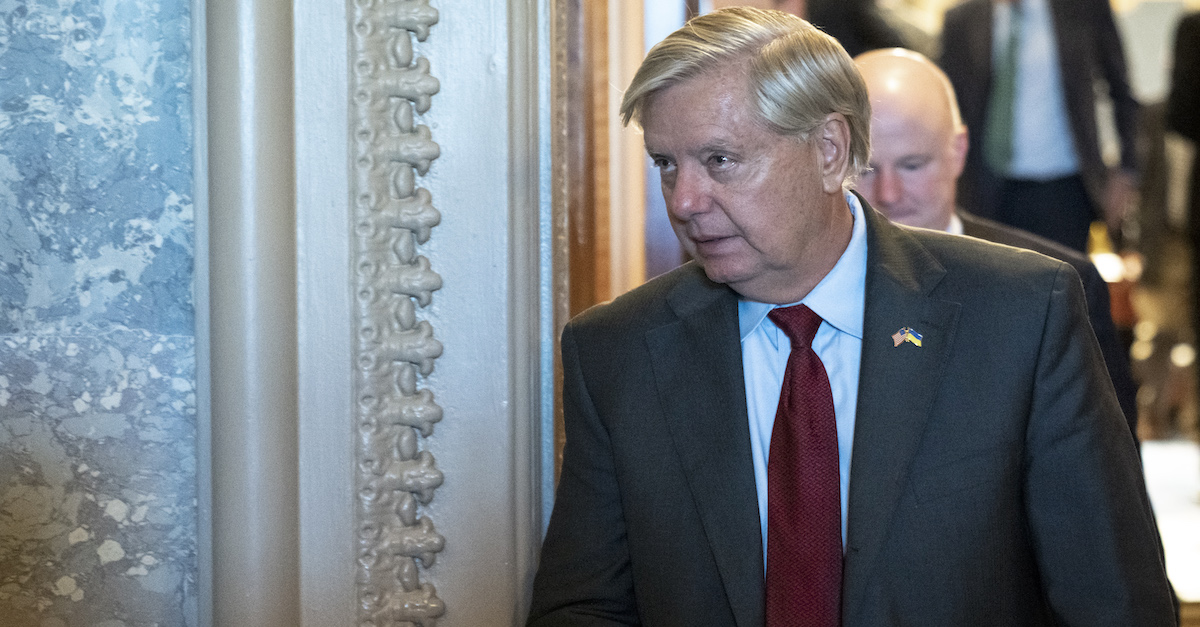
Sen. Lindsey Graham (R-SC) leaves the Senate Chamber after final passage of the Inflation Reduction Act at the U.S. Capitol August 7, 2022 in Washington, DC.
South Carolina Sen. Lindsey Graham has lost his bid to avoid answering questions about phone calls he allegedly made to Georgia election officials following the 2020 presidential election.
A special purpose grand jury in Fulton County had subpoenaed the Republican lawmaker in late July in connection with District Attorney Fani Willis‘ investigation into possible interference with the administration of the election in the Peach State. The DA’s office reportedly discovered that Graham had made “at least two telephone calls to Georgia Secretary of State Brad Raffensberger and members of his staff in the weeks following the November 2020 election in Georgia.”
Graham had tried to quash the subpoena, arguing that he was protected by the U.S. Constitution’s Speech and Debate Clause, that sovereign immunity protects him from testifying, and that he is a “high-ranking government official” and therefore should not be called away from his duties absent “extraordinary circumstances.”
U.S. District Judge Leigh Martin May rejected Graham’s arguments at nearly every turn.
“[T]he Court finds that there are considerable areas of potential grand jury inquiry falling outside the Speech or Debate Clause’s protections,” wrote May, a Barack Obama appointee, in the opinion, issued Monday. “Additionally, sovereign immunity fails to shield Senator Graham from testifying before the Special Purpose Grand Jury. Finally, though Senator Graham argues that he is exempt from testifying as a high-ranking government official, the Court finds that the District Attorney has shown extraordinary circumstances and a special need for Senator Graham’s testimony on issues relating to alleged attempts to influence or disrupt the lawful administration of Georgia’s 2022 elections.”
May said that the U.S. Speech and Debate Clause argument is based a “selective reading” of the subpoena in which Graham appears to suggest that Willis wants to ask Graham “only about the substance and logistics” of the two phone calls.
According to the judge, the subpoena is broader than that and includes “other areas of relevant inquiry on which Senator Graham has knowledge and may be questioned, including his public statements after the election, as well as conversations or interactions he had with the Trump Campaign or other third parties that are relevant to the grand jury’s investigation into attempts to disrupt the lawful administration of Georgia’s 2020 elections.”
The judge noted that the Speech or Debate Clause doesn’t protect actions that are “political in nature rather than legislative,” and that some of Graham’s alleged actions fall within that unprotected realm.
“[T]he Supreme Court has recognized that there are any number of activities a member of Congress might engage in that unquestionably fall outside the scope of protected legislative activity because they are, in fact, ‘political in nature rather than legislative,'” the judge added.
May also found Graham’s argument regarding sovereign immunity “unpersuasive and unavailing.”
“In an argument spanning just over two paragraphs, Senator Graham suggests that the doctrine of sovereign immunity sweeps so broadly as to fully preclude enforcement of the subpoena simply because he is a United States Senator,” the judge wrote. “If the Court were to accept Senator Graham’s sovereign immunity argument, it would mean that U.S. Senators would not be required to testify before state grand juries no matter the circumstances. The law would give them complete immunity based solely on their status as federal officials.”
As to Graham’s status as a high-ranking government official, May said that even if the doctrine protecting him from having to testify applies, the DA’s office has shown enough evidence of “extraordinary circumstances” to overcome it.
According to the judge’s ruling:
First, Senator Graham has unique personal knowledge about the substance and circumstances of the phone calls with Georgia election officials, as well as the logistics of setting them up and his actions afterward. And though other Georgia election officials were allegedly present on these calls and have made public statements about the substance of those conversations, Senator Graham has largely (and indeed publicly) disputed their characterizations of the nature of the calls and what was said and implied. Accordingly, Senator Graham’s potential testimony on these issues—in addition to his knowledge about topics outside of the calls such as his alleged coordination with the Trump Campaign before and after the calls are unique to Senator Graham, and Senator Graham has not suggested that anyone else from his office can speak to these issues or has unique personal knowledge of them.
May did say the Speech or Debate Clause may indeed apply to Graham, but that “the record must be more fully developed” before the judge could make a determination.
Neither Willis’ office nor attorneys for Graham immediately responded to Law&Crime’s request for comment.
Read the ruling, below.
[Image by Drew Angerer/Getty Images.]
Have a tip we should know? [email protected]